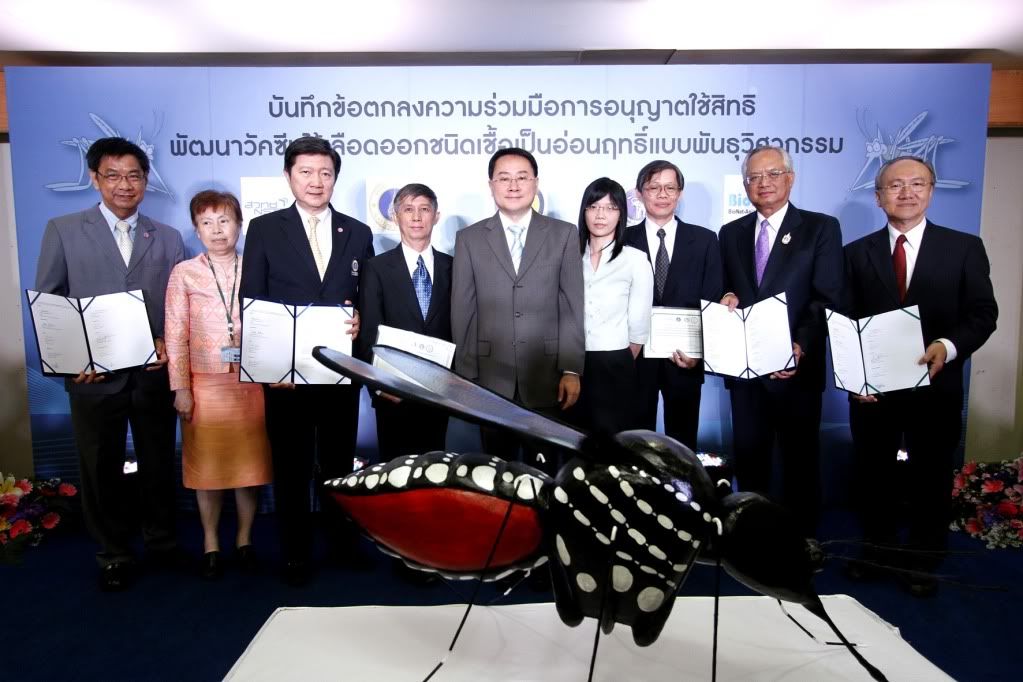สวทช./กระทรวงวิทย์ฯ โชว์ “วัคซีนไข้เลือดออก”งานวิจัยไทยทำ ครั้งแรกของอาเซียน
วันที่ 21 กุมภาพันธ์ 2554 กระทรวงวิทยาศาสตร์และเทคโนโลยี

ดร.วีระชัย วีระเมธีกุล รัฐมนตรีว่าการกระทรวงวิทยาศาสตร์และเทคโนโลยี พร้อมด้วย ดร.ทวีศักดิ์ กออนันตกูล ผู้อำนวยการสำนักงานพัฒนาวิทยาศาสตร์และเทคโนโลยีแห่งชาติ (สวทช.) คณะนักวิจัยซึ่งประกอบด้วย ดร.พูนสุข กีฬาแปง จากมหาวิทยาลัยเชียงใหม่ รศ.นพ.นพพร สิทธิสมบัติ จากมหาวิทยาลัยเชียงใหม่ และ ศูนย์พันธุวิศวกรรมและเทคโนโลยีชีวภาพแห่งชาติ/สวทช. รศ.นพ.สุธี ยกส้าน จากมหาวิทยาลัยมหิดล ร่วมกันแถลงข่าวความสำเร็จการพัฒนาวัคซีนลูกผสมเชื้อเป็นอ่อนฤทธิ์ป้องกันไข้เลือดออกครั้งแรกของโลก ตลอดจนการลงนามอนุญาตให้ บริษัท ไบโอเนท-เอเชีย รับสิทธิ์ในการรับไปพัฒนาต่อเป็นวัคซีนป้องกันไข้เลือดออกใช้ในอนาคตอันใกล้ โดย ดร.วีระชัยเปิดเผยในรายละเอียดว่า
“ปัจจุบัน การพัฒนาองค์ความรู้ทางวิทยาศาสตร์เทคโนโลยีเป็นงานสำคัญที่มีผลต่อการพัฒนาเศรษฐกิจและคุณภาพชีวิต ตลอดจนเป็นปัจจัยสำคัญสำหรับประเมินความก้าวหน้าของประเทศในสายตานานาชาติ ยิ่งถ้าเราต้องการให้ประเทศไทยพัฒนาแบบก้าวกระโดด ยิ่งจำเป็นต้องใช้งานวิจัยและพัฒนาวิทยาศาสตร์และเทคโนโลยีให้สามารถไปเพิ่มผลผลิต สร้างมูลค่าเพิ่มให้กับผลิตภัณฑ์มากขึ้น ประเด็นที่สำคัญที่สุด ที่ผมได้ให้นโยบายไว้ตั้งแต่วันแรกที่เข้ามาทำงานที่กระทรวงวิทยาศาสตร์ฯ คือ ผมเน้นการให้ความสำคัญกับการวิจัยและพัฒนาด้านเทคโนโลยีชีวภาพอย่างเต็มที่ อนาคต ถัดจากนี้ประเทศไทยจะต้องหันมาให้ความสำคัญด้านนี้มากขึ้นเพราะจะสามารถสร้างคุณประโยชน์ให้กับประเทศและมนุษยชาติได้อย่างมีประสิทธิภาพ ทั้งด้านการเกษตรและการแพทย์ ดังตัวอย่างหนึ่งที่สำคัญในวันนี้คือการพัฒนาวัคซีนลูกผสมเชื้อเป็นอ่อนฤทธิ์ป้องกันโรคไข้เลือดออก
สำหรับโรคไข้เลือดออกนี้ เริ่มอุบัติขึ้นมาในโลก ในช่วงสงครามโลกครั้งที่ 2 หลังจากนั้นได้แพร่กระจายไปทั่วแถบภูมิภาคเขตร้อน โดยมียุงลายเป็นพาหะนำโรค และเมื่อปี 2501 ได้ระบาดเข้ามายังประเทศไทย จนปี พ.ศ. 2515 ได้กลายเป็นโรคประจำถิ่นของประเทศไทย ในปี 2553 ที่ผ่านมา มีรายงานผู้ป่วยจำนวนกว่าหนึ่งแสนราย และเฉพาะเดือนมกราคมของปี 2554 มีผู้ป่วยแล้วประมาณ 1,200 ราย ซึ่งผมเชื่อว่า ตัวเลขผู้ติดเชื้อจริงนี้ ต้องมีมากกว่าตัวเลขที่มีการรายงานอย่างเป็นทางการอย่างแน่นอน รวมทั้งแนวโน้มการระบาดหรืออุบัติการณ์ของโรคน่าจะสูงขึ้นทุกปี เนื่องจากโรคนี้มีแหล่งระบาดอยู่ในเมือง ซึ่งมีจำนวนประชากรเพิ่มขึ้นตามลำดับ การคมนาคมขนส่งที่ดีขึ้นทำให้เชื้อสายพันธุ์ใหม่ๆแพร่กระจายได้อย่างกว้างขวาง รวมทั้งสถานการณ์ภาวะโลกร้อนซึ่งอาจทำให้ยุงมีจำนวนมากขึ้นในหลายๆแห่ง
โรคไข้เลือดออกมีสาเหตุสำคัญจากการติดเชื้อไวรัสเด็งกี่ ซึ่งมีถึง 4 ชนิด เมื่อคนติดเชื้อไวรัสชนิดใดจะสามารถปกป้องไวรัสเฉพาะชนิดนั้นได้ตลอดชีวิต แต่ไม่สามารถปกป้องการติดเชื้อซ้ำโดยไวรัสเด็งกี่ชนิดอื่น และภูมิคุ้มกันที่เกิดขึ้นจากการติดเชื้อไวรัสต่างชนิดนี้ อาจทำให้โรคมีความรุนแรงมากขึ้นด้วย ข้อเท็จจริงดังกล่าวทำให้การพัฒนาวัคซีนป้องกันเด็งกี่เป็นไปด้วยความยากลำบาก ซึ่งนอกจากต้องสร้างวัคซีนให้ครบทุกชนิดแล้ว ยังต้องทำให้ภูมิคุ้มกันที่เกิดขึ้นจากการได้รับวัคซีนมีระดับที่ใกล้เคียงกันด้วย จึงไม่น่าแปลกใจที่ทำไมขณะนี้เราถึงยังไม่มีวัคซีนไข้เลือดออกใช้กัน แม้ว่าทั่วโลกจะมีความพยายามพัฒนาวัคซีนมาแล้วกว่า 30 ปี
สำหรับประเทศไทย มหาวิทยาลัยมหิดล ภายใต้การนำของ ศ.นพ. ณัฐ ภมรประวัติ เป็นผู้พัฒนาวัคซีนไข้เลือดออกชนิดเชื้อเป็นอ่อนฤทธิ์เป็นรายแรก และต่อมามี รศ.นพ.สุธี ยกส้าน เป็นผู้สืบทอดเจตนารมณ์ ด้วยประสบการณ์ด้านการพัฒนาวัคซีนที่มีมานาน และความเชี่ยวชาญของ นพ.สุธี ที่ได้การยอมรับจากนานาชาติด้านไข้เลือดออก ร่วมกับความสามารถทางพันธุวิศวกรรมของ รศ.นพ. นพพร สิทธิสมบัติ จากคณะแพทยศาสตร์ มหาวิทยาลัยเชียงใหม่ ประกอบกับการสนับสนุนด้านงบประมาณ รวมทั้งการบริหารจัดการและผลักดันงานวิจัยของสำนักงานพัฒนาวิทยาศาสตร์และเทคโนโลยีแห่งชาติ (สวทช.) ก่อให้เกิดวัคซีนลูกผสมทางพันธุวิศวกรรมชนิดเชื้อเป็นแต่อ่อนฤทธิ์อีกหนึ่งชุด ที่ในวันนี้บริษัทไบโอเนท-เอเชีย ซึ่งเป็นบริษัทของคนไทยได้ขอรับไปพัฒนาต่อเพื่อให้ประชาชนไทยจะได้มีวัคซีนป้องกันโรคไข้เลือดออกใช้ในอนาคตอันใกล้ต่อไป” ดร.วีระชัยกล่าว
ด้านดร.ทวีศักดิ์ กออนันตกูล ผู้อำนวยการสวทช. กล่าวเพิ่มเติมว่า
“วิทยาศาสตร์และเทคโนโลยีของประเทศไทยก้าวหน้าขึ้นมากเมื่อเทียบกับอดีต แม้จะยังไปได้ไม่เร็วเท่าอัตราของประเทศผู้นำด้านนี้ แต่งานวิจัยของไทยหลายอย่างก็ช่วยให้เราสามารถติดตามความก้าวหน้าต่างๆได้อย่างเข้าใจมากขึ้น ทั้งนี้ ในส่วนของ สวทช.เองยังมองว่างานวิจัยพื้นฐานเป็นสิ่งสำคัญและจำเป็นอย่างยิ่งในการพัฒนาประเทศอย่างยั่งยืน ในส่วนตัวอยากเห็นการลงทุนด้านนี้แม้ว่าจะต้องใช้เวลา ความอดทนสูงและรอจังหวะที่จะนำศักยภาพผลงานวิจัยไปใช้ในเชิงพาณิชย์ได้ ซึ่งบทบาททิศทางการดำเนินงานของ สวทช. ในปัจจุบันและอนาคตจะเน้นทั้งบทบาทวิจัยผลิตองค์ความรู้ใหม่ และพัฒนาความรู้ที่ได้ ไปสร้างเทคโนโลยีมาใช้ประโยชน์แก่บ้านเมือง โดยจะรักษาสมดุลระหว่างการวิจัยและพัฒนานี้ไปด้วยกัน
สำหรับความสำเร็จของการวิจัยและอนุญาตใช้สิทธิในการพัฒนาวัคซีนลูกผสมเชื้อเป็นอ่อนฤทธิ์ป้องกันโรคไข้เลือดออกดังกล่าว จะสำเร็จขึ้นไม่ได้หากขาดความร่วมมือจากทั้ง 3 ภาคส่วน คือ สวทช. มหาวิทยาลัยมหิดล และมหาวิทยาลัยเชียงใหม่ ซึ่งความร่วมมือดังกล่าว เป็นการนำความเชี่ยวชาญของแต่ละหน่วยงานมาร่วมกันสร้างสรรค์งานวิจัยที่เป็นประโยชน์ต่อการแพทย์และสาธารณสุข ลดอัตราการชีวิตของผู้ป่วยเด็กที่ได้รับเชื้อ อีกทั้งยังเป็นการลดค่าใช้จ่ายทางการแพทย์และสาธารณสุขรวมถึงการควบคุม รักษาโรคไข้เลือดออกอย่างมีประสิทธิภาพต่อไปในอนาคตด้วย” ดร.ทวีศักดิ์กล่าว